Facebook and Cambridge Analytica: A Case of Privacy Breach
Added on 2023-05-29
21 Pages6649 Words350 Views
Business Ethics 1
BUSINESS ETHICS
BY
Name
Professor
Course
Date
BUSINESS ETHICS
BY
Name
Professor
Course
Date
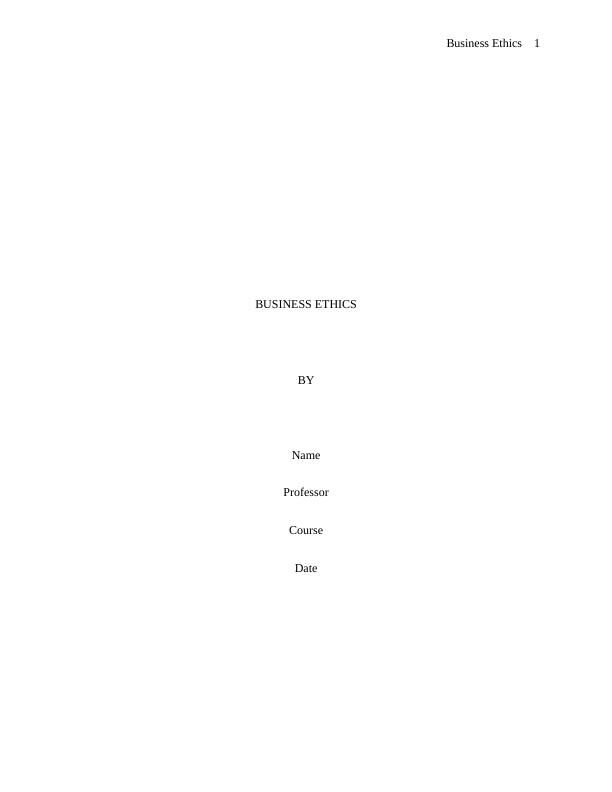
Business Ethics 2
Article 1
On November 27, 2018 at exactly 11.28pm, Frank Augstein published an article in ‘ABC News’
online newspaper portal titled “Nine countries grill Facebook in Westminster, saying democratic
institutions 'upended by billionaire frat boys.” Frank reports the outcomes of Facebook Inc. after
the company faced complaints against alleged misconduct in which involved conceptions of
privacy, truth, and democracy. According to the reporter, the founders of Facebook decided to
fore-go hearing after they were summoned. The summoning was because Facebook Inc.
allegedly went against privacy laws and thus, charged with foreign interference with the U.S.
election results and the 2016 Brexit votes. The report further states that after Mark Zuckerberg –
the CEO of Facebook declined attending the summon by the British and European leaders, the
Facebook’s chief of European policy Politicians was called for hearing instead. In the
Westminster hearing, lawmakers from the U.K. posed questions alongside Brazilian,
Argentinian, Canadian, Singaporean, as well as Latvia parliamentarians among others. However,
the chief of European policy refused to cooperate, was forced to attend parliament proceedings,
and threatened will fines for contempt of court and possible jail time (Augstein, 2018).
What is intriguing about the article written by Frank is the level of deceit that Facebook has
played on its users. Charlie Angus states – and quoted by the writer that nothing in the form of
Facebook’s operational deceit has been witnessed before. While consumers are using their apps
and playing by their phones, Facebook is in the process of upending world democratic
institutions (with the narrator describing the CEO as a frat-boy billionaire from California).
Angus then adds that by the organization of Facebook trying to use the tactics of misinformation
– instead of practicing accountability; it has lost the trust of the people (Ferrell & Fraedrich,
2015). However, regulators are concerned while many other global lawmakers trying to pressure
Article 1
On November 27, 2018 at exactly 11.28pm, Frank Augstein published an article in ‘ABC News’
online newspaper portal titled “Nine countries grill Facebook in Westminster, saying democratic
institutions 'upended by billionaire frat boys.” Frank reports the outcomes of Facebook Inc. after
the company faced complaints against alleged misconduct in which involved conceptions of
privacy, truth, and democracy. According to the reporter, the founders of Facebook decided to
fore-go hearing after they were summoned. The summoning was because Facebook Inc.
allegedly went against privacy laws and thus, charged with foreign interference with the U.S.
election results and the 2016 Brexit votes. The report further states that after Mark Zuckerberg –
the CEO of Facebook declined attending the summon by the British and European leaders, the
Facebook’s chief of European policy Politicians was called for hearing instead. In the
Westminster hearing, lawmakers from the U.K. posed questions alongside Brazilian,
Argentinian, Canadian, Singaporean, as well as Latvia parliamentarians among others. However,
the chief of European policy refused to cooperate, was forced to attend parliament proceedings,
and threatened will fines for contempt of court and possible jail time (Augstein, 2018).
What is intriguing about the article written by Frank is the level of deceit that Facebook has
played on its users. Charlie Angus states – and quoted by the writer that nothing in the form of
Facebook’s operational deceit has been witnessed before. While consumers are using their apps
and playing by their phones, Facebook is in the process of upending world democratic
institutions (with the narrator describing the CEO as a frat-boy billionaire from California).
Angus then adds that by the organization of Facebook trying to use the tactics of misinformation
– instead of practicing accountability; it has lost the trust of the people (Ferrell & Fraedrich,
2015). However, regulators are concerned while many other global lawmakers trying to pressure
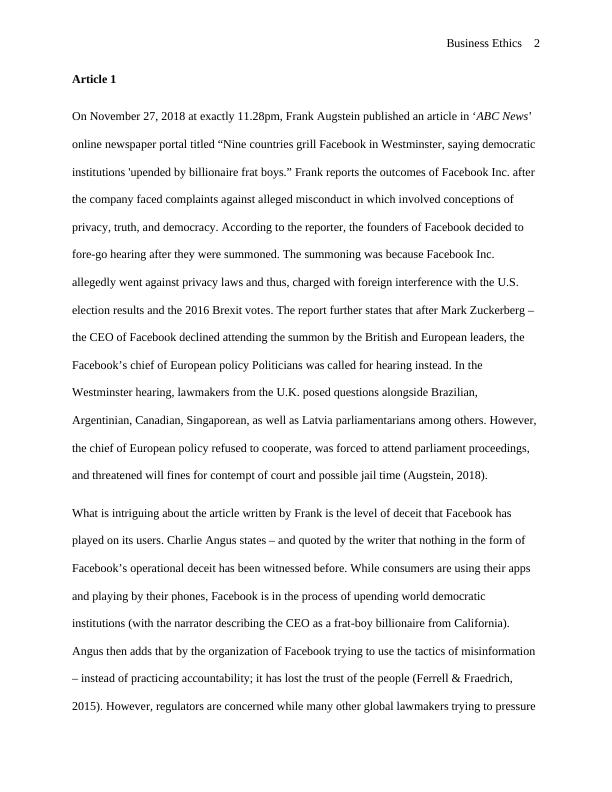
Business Ethics 3
Facebook to provide an explanation to why Facebook declined protecting information privacy
for its users. Cambridge Analytica is among several institutions that worked alongside Facebook
to perform data breaches. According to reports, Cambridge Analytica used Facebook – back in
2014 to acquire the 50 million user profiles for its research processes (Basu, 2010). By providing
the 50 million user profiles, Facebook conducted a consequential data breach compared to none
in the entire social networking history. By exposing private information to its users, business
organizations have reported several problematic aspects of Facebook’s case. Most importantly,
serious ethical misappropriation takes place as soon as Cambridge Analytica gets involved in the
harvesting of private data of unknowing individuals (Cambridge Dictionaries, 2014). To make it
worse, not a single Facebook user was noted on the existence of surveys from Cambridge
Analytica and that personal information would be provided to a third party. The act – among
other several misappropriations go against the terms of service of Facebook. According to the
Federal Trade Commission’s guidelines, it is important to destroy information once they reach
unauthorized individuals. However, Facebook never complied with such guideline and ended up
keeping the data all the same (Rees & Smith, 2017). Afterwards, the Facebook gave Cambridge
Analytica was instrumental in creating techniques and models that influence Americans voted.
However, upon question, Cambridge Analytica denied ever receiving public information from
Facebook. As reported by its chief executive officer, Cambridge Analytica denounced being part
of providing service towards encouraging Trump’s win during the presidential campaign in
2016. On the other hand, questions arose whether Trump’s win in the just ended presidential heat
was advantaged by corruption of election data. Related research outcomes also show that
Facebook attempted to cover up the case by suspending Cambridge Analytica two year after the
discovery of the breach (Ruthergien, 2016). ABC News reports that some data related to the
Facebook to provide an explanation to why Facebook declined protecting information privacy
for its users. Cambridge Analytica is among several institutions that worked alongside Facebook
to perform data breaches. According to reports, Cambridge Analytica used Facebook – back in
2014 to acquire the 50 million user profiles for its research processes (Basu, 2010). By providing
the 50 million user profiles, Facebook conducted a consequential data breach compared to none
in the entire social networking history. By exposing private information to its users, business
organizations have reported several problematic aspects of Facebook’s case. Most importantly,
serious ethical misappropriation takes place as soon as Cambridge Analytica gets involved in the
harvesting of private data of unknowing individuals (Cambridge Dictionaries, 2014). To make it
worse, not a single Facebook user was noted on the existence of surveys from Cambridge
Analytica and that personal information would be provided to a third party. The act – among
other several misappropriations go against the terms of service of Facebook. According to the
Federal Trade Commission’s guidelines, it is important to destroy information once they reach
unauthorized individuals. However, Facebook never complied with such guideline and ended up
keeping the data all the same (Rees & Smith, 2017). Afterwards, the Facebook gave Cambridge
Analytica was instrumental in creating techniques and models that influence Americans voted.
However, upon question, Cambridge Analytica denied ever receiving public information from
Facebook. As reported by its chief executive officer, Cambridge Analytica denounced being part
of providing service towards encouraging Trump’s win during the presidential campaign in
2016. On the other hand, questions arose whether Trump’s win in the just ended presidential heat
was advantaged by corruption of election data. Related research outcomes also show that
Facebook attempted to cover up the case by suspending Cambridge Analytica two year after the
discovery of the breach (Ruthergien, 2016). ABC News reports that some data related to the
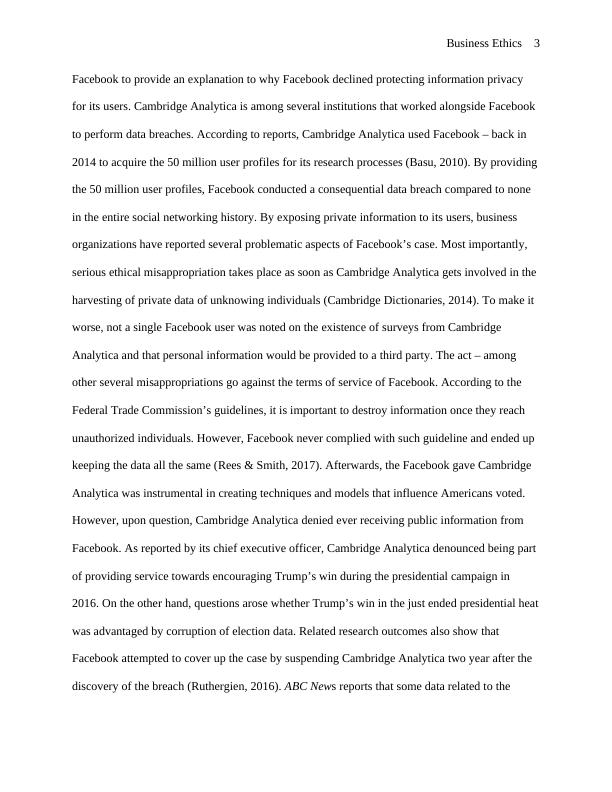
Business Ethics 4
incident is still present in the internet. Moreover, in as much as Cambridge Analytica denies
inappropriately using data provided by Facebook, a whistleblower – who also happens to be a
former employee in the company, emphatically contradict such claims (Apple, 2014).
Currently, Facebook closes to about 2.1bn clients. From the 2.1bln, around 1.7bn uses the
platform on a daily basis. Since it is a social networking platform, individuals have the freedom
to share photos, ideas, as well as life events with family members and friends. Therefore,
Facebook has to provide the highest user image as well as the finest media company – while
noting that it also emphasizes on user emotions. However, with time, Facebook has become a hot
bet for business activities with advertisers targeting more than half the 2.2bn users to market
their brands (Andreotti & Pashby, 2013, pg. 231). However, few years ago, researchers
highlighted that the algorithms of Facebook could be employed in predicting political and or
product preferences using Facebook ‘likes’. Such researchers were however; more concerned
with privacy implications since Facebook's default likes settings is public. Therefore, Cambridge
Analytica – while using the research outcomes performed years ago as its basis of breaching
private information, thought it had the ability to change the politics of U.S. through exploitation
of insight. From such ethical incidences affecting the operation of Facebook, it is clear that
companies should protect private information of its customers. With technology growing
broader, millions of individuals are victims of privacy breaches and associated outcomes
(Andreotti, Jefferess, Pashby, Rowe, Tarc & Taylor, 2010, pg. 11).
The law is clear about breaching personal information. The access of an individual’s public
information is termed as privacy breach. In most cases, privacy breach occurs in the form of
disclosing personal data against privacy policies and legislation. Different statuses define
personal information differently (Articadv, 2014). However, private information forms the
incident is still present in the internet. Moreover, in as much as Cambridge Analytica denies
inappropriately using data provided by Facebook, a whistleblower – who also happens to be a
former employee in the company, emphatically contradict such claims (Apple, 2014).
Currently, Facebook closes to about 2.1bn clients. From the 2.1bln, around 1.7bn uses the
platform on a daily basis. Since it is a social networking platform, individuals have the freedom
to share photos, ideas, as well as life events with family members and friends. Therefore,
Facebook has to provide the highest user image as well as the finest media company – while
noting that it also emphasizes on user emotions. However, with time, Facebook has become a hot
bet for business activities with advertisers targeting more than half the 2.2bn users to market
their brands (Andreotti & Pashby, 2013, pg. 231). However, few years ago, researchers
highlighted that the algorithms of Facebook could be employed in predicting political and or
product preferences using Facebook ‘likes’. Such researchers were however; more concerned
with privacy implications since Facebook's default likes settings is public. Therefore, Cambridge
Analytica – while using the research outcomes performed years ago as its basis of breaching
private information, thought it had the ability to change the politics of U.S. through exploitation
of insight. From such ethical incidences affecting the operation of Facebook, it is clear that
companies should protect private information of its customers. With technology growing
broader, millions of individuals are victims of privacy breaches and associated outcomes
(Andreotti, Jefferess, Pashby, Rowe, Tarc & Taylor, 2010, pg. 11).
The law is clear about breaching personal information. The access of an individual’s public
information is termed as privacy breach. In most cases, privacy breach occurs in the form of
disclosing personal data against privacy policies and legislation. Different statuses define
personal information differently (Articadv, 2014). However, private information forms the
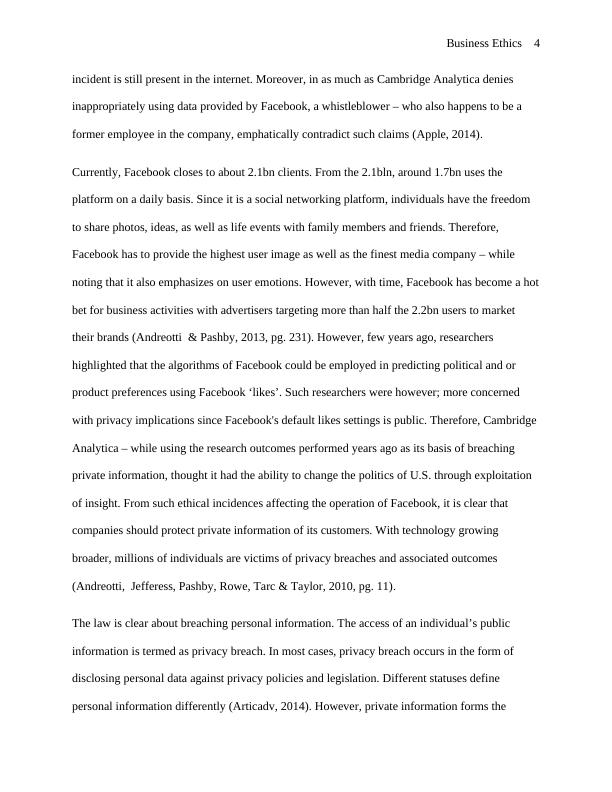
Business Ethics 5
building block of several privacy laws. There are several types and examples of personal
information. However, examples that are more obvious include one’s nationality, home address,
ethnic origin, religion, color, marital status, level of education, or criminal history among others.
Most importantly, information privacy breach may be inadvertently or intentionally with the
outcomes devastating to its victims. Intentional information privacy breaches involve
manipulation of technology or thievery mostly used to protect or catalogue personal information
(Brea-Solís, Casadesus-Masanell & Grifell-Tatjé, 2012). The process may also involve hacking
that is about breeching electronic safeguards computer systems. When hacking is involved, the
problem might be serious since many multinational companies and government agencies rely on
databases that are heavily computerized. Intentional breaches may be vicious as well because
they may occur due to deliberate desires to collect, access, disclose, or use personal information
with the intention of perpetrating a crime or causing disturbance (Ferrell & Fraedrich, 2015).
On the other hand, information privacy breaches may result from ignorance or human error.
Breaches that result from ignorance and human error happen due to mistaken disclosures,
careless practices, or communication breakdowns. However, it does not matter that such
breeches are performed without malice since they are as greave as intentional breaches. When
privacy laws are breached, affected individuals are most likely, standing a chance of losing their
jobs and opportunities, face identity theft and physical risks, as well as embarrassment (Miller &
Le Breton-Miller, 2005). Most importantly, private information breach may cause financial
losses to major multinational firms. No matter the kind of breach that an organization faces – and
whether the information achieved illegally is used in fraud perpetuation or not, the organization
will face the same consequences of private information breach. Otherwise, it is prudent that
organization be aware of the responsibilities they hold towards handling private information – as
building block of several privacy laws. There are several types and examples of personal
information. However, examples that are more obvious include one’s nationality, home address,
ethnic origin, religion, color, marital status, level of education, or criminal history among others.
Most importantly, information privacy breach may be inadvertently or intentionally with the
outcomes devastating to its victims. Intentional information privacy breaches involve
manipulation of technology or thievery mostly used to protect or catalogue personal information
(Brea-Solís, Casadesus-Masanell & Grifell-Tatjé, 2012). The process may also involve hacking
that is about breeching electronic safeguards computer systems. When hacking is involved, the
problem might be serious since many multinational companies and government agencies rely on
databases that are heavily computerized. Intentional breaches may be vicious as well because
they may occur due to deliberate desires to collect, access, disclose, or use personal information
with the intention of perpetrating a crime or causing disturbance (Ferrell & Fraedrich, 2015).
On the other hand, information privacy breaches may result from ignorance or human error.
Breaches that result from ignorance and human error happen due to mistaken disclosures,
careless practices, or communication breakdowns. However, it does not matter that such
breeches are performed without malice since they are as greave as intentional breaches. When
privacy laws are breached, affected individuals are most likely, standing a chance of losing their
jobs and opportunities, face identity theft and physical risks, as well as embarrassment (Miller &
Le Breton-Miller, 2005). Most importantly, private information breach may cause financial
losses to major multinational firms. No matter the kind of breach that an organization faces – and
whether the information achieved illegally is used in fraud perpetuation or not, the organization
will face the same consequences of private information breach. Otherwise, it is prudent that
organization be aware of the responsibilities they hold towards handling private information – as
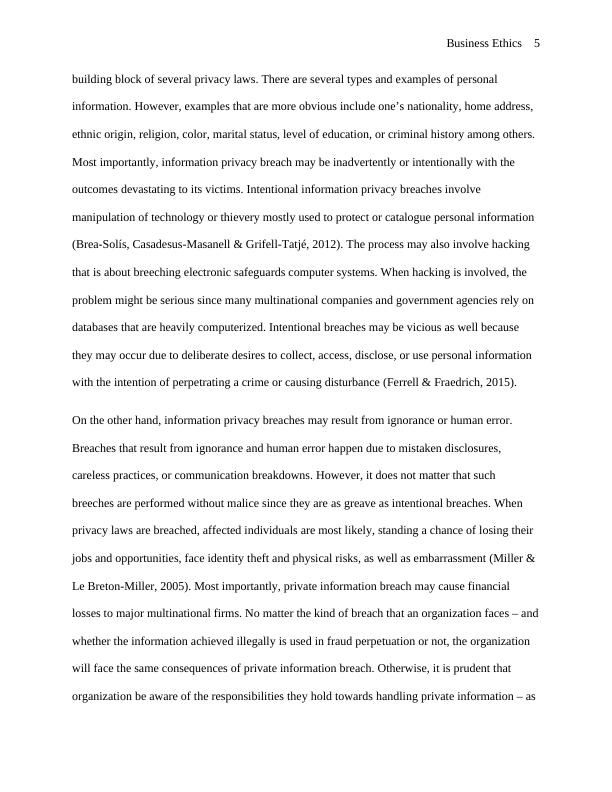
Business Ethics 6
stipulated in the laws governing the land. Therefore, business organizations should implement
practices that prevent private information from reaching the domain of unauthorized personnel
(Andreotti & Pashby, 2013, pg. 230).
To conclude on this matter, it is important to destroy private when usage is complete. Coming up
with proper disposal and information destruction policies is vital in preventing breaches. Policies
of destroying personal information should account for the destruction of technological and
physical elements of the information. Most importantly, hard copy or paper records with
personal information need shredding. However, the process of destroying personal data should
be monitored and certified (Bysani, 2013). On the other hand, unnecessary electronic files need
to be destroyed or wiped out. It is also important that organizations respond to privacy breaches
by enacting preventative measures and best practices. As mentioned before, information privacy
breach may be inadvertently or intentionally with the outcomes devastating to its victims. For
intentional information privacy breaches, thievery or manipulation of technology is employed
with the intention of protecting or cataloguing personal information (Grollman, 2014, pg. 6). The
process may also involve hacking that is about breeching electronic safeguards computer
systems. Intentional breaches may be vicious because they are likely to occur as deliberate
desires to collect, access, disclose, or use personal information with the intention of perpetrating
a crime or causing disturbance. However, information privacy breaches may result from
ignorance or human error. Breaches that result from ignorance and human error happen due to
mistaken disclosures, careless practices, or communication breakdowns. Contrarily, privacy
protection weaknesses do not create alarm in most cases until breaches occur. In such a case, the
breach is described as an outcome of employing business practices that are faulty. The breach
may also result from operational breakdowns (Belcher, 2009). Therefore, an organization must
stipulated in the laws governing the land. Therefore, business organizations should implement
practices that prevent private information from reaching the domain of unauthorized personnel
(Andreotti & Pashby, 2013, pg. 230).
To conclude on this matter, it is important to destroy private when usage is complete. Coming up
with proper disposal and information destruction policies is vital in preventing breaches. Policies
of destroying personal information should account for the destruction of technological and
physical elements of the information. Most importantly, hard copy or paper records with
personal information need shredding. However, the process of destroying personal data should
be monitored and certified (Bysani, 2013). On the other hand, unnecessary electronic files need
to be destroyed or wiped out. It is also important that organizations respond to privacy breaches
by enacting preventative measures and best practices. As mentioned before, information privacy
breach may be inadvertently or intentionally with the outcomes devastating to its victims. For
intentional information privacy breaches, thievery or manipulation of technology is employed
with the intention of protecting or cataloguing personal information (Grollman, 2014, pg. 6). The
process may also involve hacking that is about breeching electronic safeguards computer
systems. Intentional breaches may be vicious because they are likely to occur as deliberate
desires to collect, access, disclose, or use personal information with the intention of perpetrating
a crime or causing disturbance. However, information privacy breaches may result from
ignorance or human error. Breaches that result from ignorance and human error happen due to
mistaken disclosures, careless practices, or communication breakdowns. Contrarily, privacy
protection weaknesses do not create alarm in most cases until breaches occur. In such a case, the
breach is described as an outcome of employing business practices that are faulty. The breach
may also result from operational breakdowns (Belcher, 2009). Therefore, an organization must
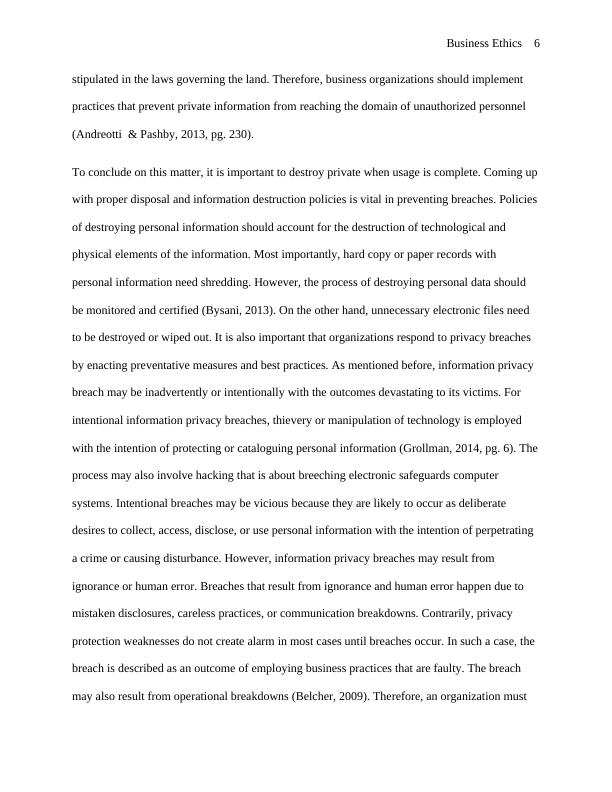
End of preview
Want to access all the pages? Upload your documents or become a member.